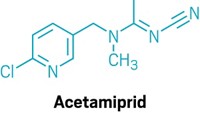Advertisement
Grab your lab coat. Let's get started
Welcome!
Welcome!
Create an account below to get 6 C&EN articles per month, receive newsletters and more - all free.
It seems this is your first time logging in online. Please enter the following information to continue.
As an ACS member you automatically get access to this site. All we need is few more details to create your reading experience.
Not you? Sign in with a different account.
Not you? Sign in with a different account.
ERROR 1
ERROR 1
ERROR 2
ERROR 2
ERROR 2
ERROR 2
ERROR 2
Password and Confirm password must match.
If you have an ACS member number, please enter it here so we can link this account to your membership. (optional)
ERROR 2
ACS values your privacy. By submitting your information, you are gaining access to C&EN and subscribing to our weekly newsletter. We use the information you provide to make your reading experience better, and we will never sell your data to third party members.
Pesticides
France bans all uses of neonicotinoid pesticides, outpacing European Union measure
by Paula Dupraz-Dobias, special to C&EN
September 5, 2018
| A version of this story appeared in
Volume 96, Issue 36

On Sept. 1, France outlawed five neonicotinoid pesticides to help protect its bee population.
The move makes France the first country to impose a blanket ban on the chemicals, putting it ahead of a European Union decision earlier this year that prohibited outdoor use of three types of neonicotinoid pesticides.
A decrease in bee populations in Europe and elsewhere through so-called colony collapse disorder has led to growing scrutiny in the use of the substances. Neonicotinoids bind to neurotransmitter receptors and may be addictive to bees.
A United Nations-sponsored report detailing the extinction threat for pollinator species found that 75% of global crops rely, at least in part, on the insects.
French farmers’ unions and pesticide manufacturers oppose the ban, arguing that the pesticides are critical to protecting plants from invasive pests. They also claim that not enough evidence exists linking the pesticides to bee decline.
In April, European Union member states voted in favor of banning the outdoor use of three types of neonicotinoid pesticides—clothianidin, imidacloprid and thiamethoxam—for outdoor use by the end of 2018. They could continue to be used in greenhouses. Two other neonicotinoids—thiacloprid and acetamiprid—included in the French ban are not covered by the European decision.





Join the conversation
Contact the reporter
Submit a Letter to the Editor for publication
Engage with us on Twitter